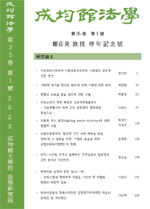헌법상 교육을 받을 권리에 대한 고찰
The study on the constitutional right to education
- 성균관대학교 법학연구원
- 성균관법학
- 제35권 제1호
-
2023.0363 - 96 (34 pages)
-
DOI : 10.17008/skklr.2023.35.1.003
- 72

과학기술이 혁명적으로 발전하여 초연결사회가 되어도 사회적 재난을 피할 수는 없다. 사회적 재난 중에 하나로 감염병이 있으며, 감염병인 코로나는 개인뿐만 아니라 사회에도 많은 영향을 주어 사회적 불평등이 심화하였다. 이는 경기침체의 장기화가 예상되고, 교육격차를 더 심화시킬 것이라는 우려 가운데 교육에 대한 패러다임 전환이 필요하게 되었다. 헌법에서는 제31조에 ‘교육을 받을 권리’가 규정되어 있다. 또한, 교육기본법 제3조에서도 “모든 국민은 평생에 걸쳐 학습하고, 능력과 적성에 따라 교육 받을 권리를 가진다”라고 학습권 규정가운데 ‘교육을 받을 권리’가 명시되어 있다. 교육을 받을 권리의 개념을 면밀하게 살피기 위해 교육을 받을 권리와 학습권과의 관계를 살펴보았을 때 ‘교육을 받을 권리를 학습권과 동일한 개념으로 보는 설’에서는 헌법 제31조 제1항의 문리해석 범위 내에서 해석하려는 경향이 짙었고, ‘교육을 받을 권리를 학습권 일부로 보거나 교육기본권 일부로 보는 설’에서는 헌법 제31조 제1항의 문리해석 범위를 넘어 해석하면서 주로 헌법 제10조를 근거로 하였다. 한편, 판례는 헌법 제31조 제1항을 근거로 학생과 관련될 때 ‘교육을 받을 권리’와 ‘학습권’을 동일하게 보았다. 교육을 받을 권리와 학습권과의 관계를 살펴본 결과 헌법 제31조 제1항의 ‘교육을 받을 권리’의 규범적 의미에서 ‘교육받는다’라는 것보다 ‘권리’에 방점을 두고 해석해야 할 필요성을 발견하였다. 그러할 때 ‘교육을 받을 권리’를 인권으로서의 학습권으로도 볼 수 있다. 결론적으로 교육 환경이 변화할 수 있는 상황을 대비할 제도가 마련되도록 헌법 개정을 통해 학습권을 헌법에 명시해야 한다. 헌법이 개정되기 전까지는 헌법 제31조 제1항의 ‘교육받는다’라는 의미를 학습자의 관점과 학습권이 내포한 뜻에 가깝게 해석함으로써 헌법 현실과 헌법 규정 사이의 간극을 메우는 노력을 지속적으로 해야 할 것이다.
Even though science and technology have revolutionized and become a hyper-connected society, social disasters cannot be avoided. One of the social disasters is infectious diseases, and the COVID-19 pandemic has affected not only individuals but also society, leading to a deepening of social inequality. As a result, a paradigm shift in education is needed amid concerns that the economic recession is expected to be prolonged and the educational gap will be further deepened. Article 31 of the Constitution stipulates “the right to education”. However, in Article 3 of the Framework Act on Education, the right to learn is stipulated as “every citizen shall have a right to learn through life and to receive an education according to his or her abilities and aptitudes” in order to closely examine the concept of the right to education, we studied the relationship between the right to education and the right to learn. In the ‘opinion on the right to education as the same concept as the right to learn’, there was a strong tendency to interpret Article 31(1) within the scope of the literal interpretation of the Constitution. In the ‘opinion regarding the right to education as part of the right to learn or part of the fundamental right to education’, it was interpreted outside the scope of the literary interpretation of Article 31(1) of the Constitution, and was interpreted mainly based on Article 10 of the Constitution. Also, based on Article 31(1) of the Constitution, the Constitutional Court saw “the right to education” and “the right to learn” as the same when it comes to students. Regarding the relationship between the right to education and the right to learn, “the right to education” in Article 31(1) of the Constitution should be interpreted with emphasis on “right” rather than “be educated”. Then, the right to education can be extended to the meaning of the right to learn as a human right. In conclusion, a system must be prepared to prepare for the situation in which the educational environment can change, which means a Constitutional amendment that stipulates the right to learn in the Constitution. Until the Constitution is amended, efforts will have to be made to bridge the gap between Constitutional reality and Constitutional provision by interpreting the meaning of “be educated” in Article 31(1) to be similar to the meaning of the right to learn.
Ⅰ. 서론
Ⅱ. 교육을 받을 권리의 연혁과 의의
Ⅲ. 교육을 받을 권리와 학습권간의 논의
Ⅳ. 교육을 받을 권리 재해석의 필요성과 방향
Ⅴ. 결론
(0)
(0)